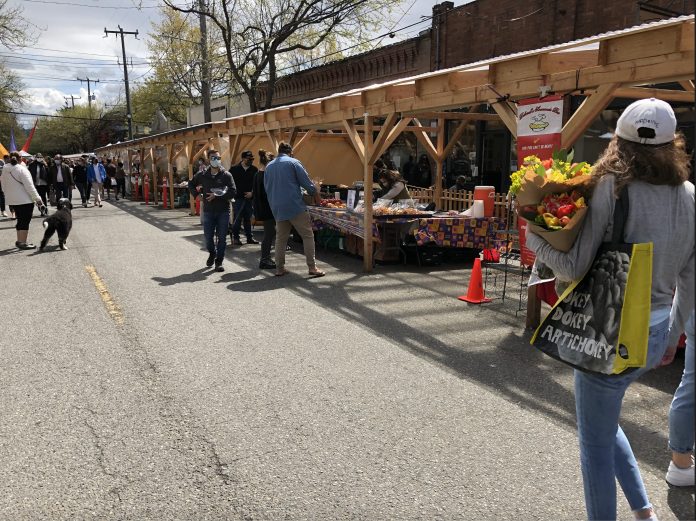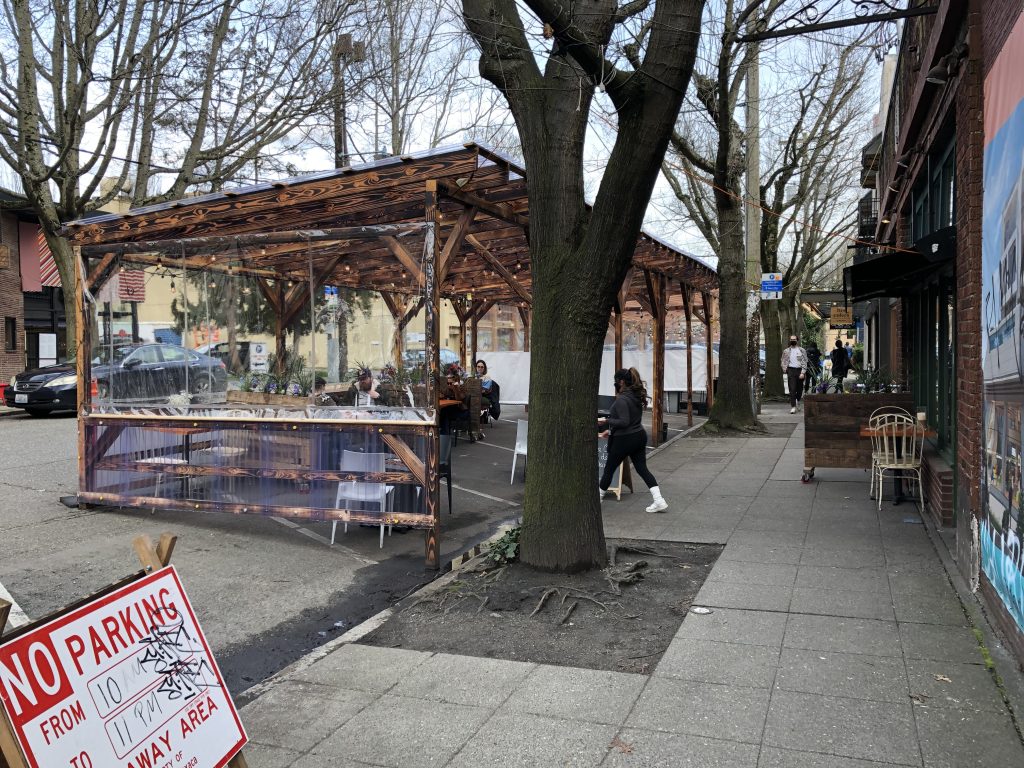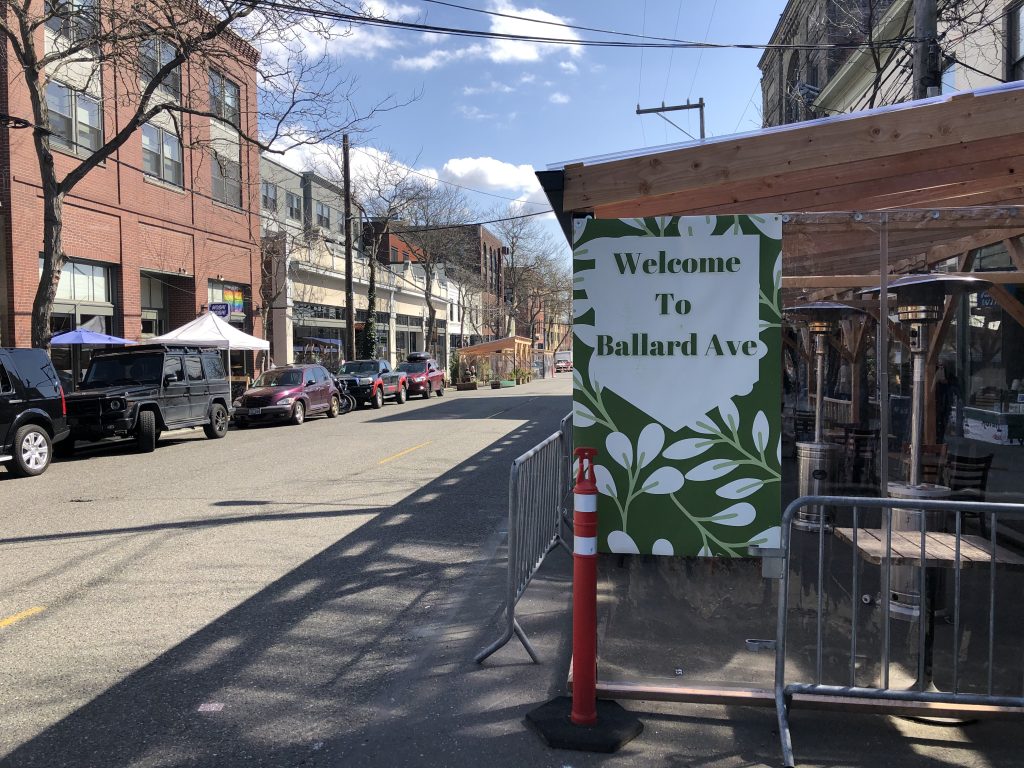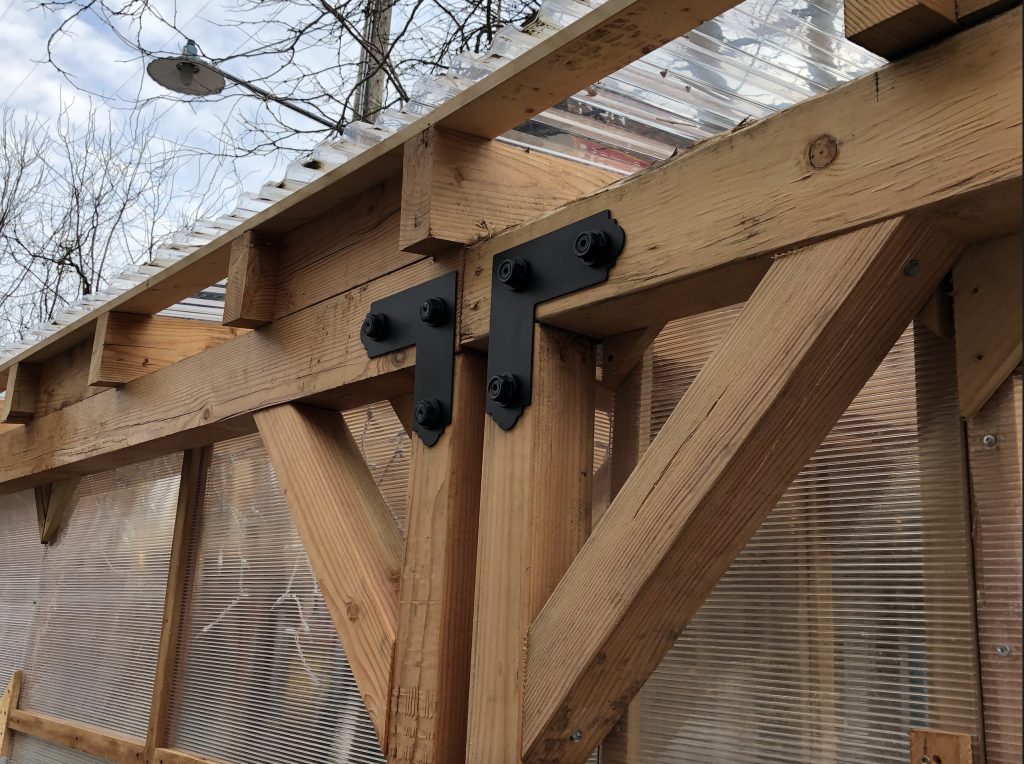
The Urbanist spoke with business owners and leaders who have spent the last year trying to keep restaurants, shops, and the farmers market working along Ballard Avenue. The result, after a series of more makeshift shelters over the course of the pandemic, has been a row of sturdily built wooden pergolas to shield street cafes that double as farmers market stalls on Sundays. Read on to see how Ballard businesses innovated and teamed up to make it happen.
Comments are edited for clarity. Each interview, whether over the phone and by email, started with the question, “It’s been a long year. How are things going today?”
Mike Stewart – Executive Director, Ballard Alliance
2020 was a challenging year that required constant change and adaptation for the Ballard Alliance, business owners, and city government. The Mayor’s Office, Councilmember Strauss, and city department leaders were very responsive to the needs of small business owners and I applaud their efforts to help us make outdoor street cafes and merchandise displays a reality.
Adam McQueen – Founder/Owner, Skål Beer Hall
The last year has been a challenge. Thanks to the wonderful support of our loyal customers we are emerging from the pandemic on solid ground. More permanent, covered outdoor seating saved us during the winter when indoor dining was banned. We’re a Viking beer hall after all. Our customers are tough. They weathered the elements. I mean who doesn’t want to sip boozy hot chocolate next to a roaring fire pit?! We did not have any outdoor seating prior to the city allowing us to use the curbside space, so we are happy to have it as the warm weather arrives.
Jeff Gardner – Owner, Standard Goods
It’s been a tough year. Coming out of lockdown, getting set up with these pergola structures was huge. It brought people, it’s not about me as the restaurants. That they hustled and got outside. They got people coming down from Shoreline and the whole west side of the city. You could come out and get a meal or cocktail. It’s good to have our stuff outside. And it gets us some more square footage. Ballard revenues have been twice as good as our Capital Hill store, I think it’s all about the environment outside that we’ve created outside on the street.
Doug Farr – Executive Director, Seattle Farmers Market Association (Ballard Farmer’s Market)
We had to fight. There were a lot of farmers during the shutdown that still kept showing up on the street because they don’t have the option to just shut down. Crops are still there and animals need to be fed and farmers do not get unemployment. There were a lot of farmers that kept showing up without our permission. The Mayor’s Office told us they need to go home. That’s not my problem, you took my permit away which took my authorization for that street away, so I’m staying home.
We first created the model of a drive through for a number of months, then pivoted to a walk-drive through. Then we evolved back to a walkthrough market. But we opened up an on-line market that customers can order online without coming into the market. We pivoted so the shoppers, whether for health or safety concerns or they cannot come down to the market for whatever reason, we’ve made it different options for them.
Because of health department rules, we have to have social distancing and lowered our capacity. About half of the vendors are back at the market. So a lot of those vendors that we don’t have enough space for are on our online market so the customers can place orders and pick them up.
[Requests to the Mayor’s Office for comment were gently directed to SDOT, who replied: “Currently, we are developing the next steps for our Safe Start permits and will let you know when we have more to share. To answer your question on the Farmers Markets, during COVID we will continue to permit these out from SDOT in partnership with the Mayor’s Office and Public Health. However, we will return to regular permitting out of the Office of Economic Development (OED) post-COVID.”]
How has your setup changed over the course of the last year? How was it working with the City?
Jeff Gardner – Standard Goods
First thing we did was get a tent. Then the tent blew over. Then we got sandbags and we got another tent after a particular windstorm. We had to tear them down at the end of the day or they won’t be there. Effort and work and rolling out stuff. We also set up a space with rabbit fence we’d have to take the whole thing down every Saturday night for the Farmers Market. It was like a lot of work and more hours for everyone.
When we had the opportunity to build the pergolas. We shared with Other Coast Cafe and so my part was $3,000. That was after probably $1,000 on tents and $500 on outside equipment. And the extra 3 hours of pay at $20 an hour to move things outside and in. It adds up pretty fast. Each and every day. Now it takes 15 minutes to set up, but we made a big investment up front.
Adam McQueen – Skål
At first, we were required to take in all of our furniture, canopies, etc at the end of every shift and put them all back out in the morning. This is not efficient from a labor perspective and not a model I would want to do again. We had our talented furniture guru design mobile fencing that matched the aesthetic of our beer hall. This gave us a nice looking space out on the street and allowed us to be versatile with the footprint, expanding or contracting based on when our neighbors were or were not using their outdoor real estate. We now have a covered pergola, flower boxes, and other items that stay out all night. This is much preferred.
Tommy Patrick – Owner, The Ballard Cut and Parish NW
Before [the pergolas] it was just like everyone else’s — a little gate and outdoor chairs and shades. It wasn’t anything to write home about. Your run-of-the-mill setup. Customers started asking what are you going to do when it gets bad outside and a tent isn’t enough. “I don’t know, do you want another beer or not.”
Doug Farr – Ballard Farmer’s Market
We’ve had to adapt a lot through this pandemic. When the pandemic first hit and we were reopening, we had to be very cautious because the public perception was the Farmer’s Market is a very crowded environment. That was something we used as a marketing tool for so many years – that we were the gathering place for the community. We were the old time park where all the community gathered on a Sunday afternoon. We created the model as an organization for so many years. When the pandemic hit, we had to pivot and change our website with social distance and safety and how we’re reopening under social distancing. We received quite a few emails and a lot of comments about how they were not going to come to farmers markets because it was a gathering place for COVID to breed.
When we first reopened, most thanked us for what we were doing. At least 90% thanked us one-by-one. That was the most rewarding part with all the fight to get reopen. Once we got reopened, the customer and community response was unbelievable.
Mike Stewart – Ballard Alliance
The Ballard Alliance worked with Ballard Avenue business owners, several city departments, and the Ballard Farmer’s Market to develop a street cafe program that would benefit all businesses and preserve market operations. By obtaining a permit to temporarily reconfigure traffic on Ballard Avenue to one-way northbound, we were able to provide an appropriate amount of curb space for street cafes to use Monday through Saturday, and, at the same time, provide a thriving environment for the Farmer’s Market on Sundays in Ballard.
Dan Strauss – Seattle City Council, District 6
We stewarded the process with SDOT and the Ballard Alliance stewarded the process with businesses. Working together made this a success. Everyone did their part and when that happens, we can have successes like that. Give as much credit to the business themselves. Give as much credit as possible.
Adam McQueen – Skål
Unlike the building permit process for small businesses (which is challenging at best), the city was relatively easy to work with for the outdoor dining permits and has been supportive of all of our efforts to keep afloat.
Jeff Gardner – Standard Goods
The city was really good about it. They made permitting super easy. You don’t get what you want. There was back and forth with the Farmer’s Market. They have their reasons. COVID is a problem. Everybody’s doing the best they can. They tried to do the best they can. The big plus is to make it as permanent as we can so we can recoup our business. We lost a half million in revenue for three months we were closed. If we can get somewhat back to normal. The more time we can have with those people in the outdoor space. Restaurants can get six more tables outside. It can help get back on their feet again.
What went into the pergolas taking the shape they became?
Doug Farr – Ballard Farmer’s Market
When the outdoor cafes were announced, SDOT was not informing businesses that our permit took precedence. They were just giving out the permits and overlooked our permit. We were fighting for our street permit against some businesses that were using it for a cafe. They were struggling for survival. We were needing to put on a safe environment. They had customers without masks eating in the middle of our market. We heard the backlash from our customers.
SDOT went back through and notified the restaurants. Future restaurants were informed that they had to accommodate the Farmer’s Market. It still had set a precedence. It took a few months of negotiating with the restaurants for the space on Sundays. And we made the concession of moving the market up an hour and getting off the street as fast as possible. We get out two hours earlier than we used to so they can take advantage of the afternoon and evening.
That’s when a lot of the temporary street cafes were very temporary. They were still making it fast take-up and down. The Ballard Cut was the first that contacted me and wanted to put up something more permanent and make sure it worked with the farmer’s market so he didn’t have to take it down.
Mike Stewart – Ballard Alliance
Tommy Patrick, owner of The Ballard Cut and Parish NW, initially developed the pergola style street café and was the first to use that construction style in a street café. Tommy graciously shared his designs and other business owners quickly developed a similar style with some minor variations. The pergolas have been very effective in providing adequate shelter for outdoor dining, particularly during inclement weather. Additionally, the pergolas are ideal structures for use by Farmer’s Market vendors on Sundays.
Tommy Patrick – The Ballard Cut
Over the course of the summer, there was a large discussion between Market and businesses because dining went outdoor and business went to the cafe business model. Sundays became a hot commodity. Discourse over who could use the street. The Farmer’s Market had a longer standing permit than the cafes for the restaurants, so they were giving the right of way to use the Sunday timeframe when there were a lot of people coming and rightfully so because it’s one day a week. I’m happy to share and considering I get 70% of my goods from the Farmer’s Market. Please don’t go anywhere. I need them.
Mike Stewart from the Ballard Alliance brokered a deal with those advocating for the restaurants. Since the Market gets Sunday, instead of seven feet we would get 12 feet if we relinquish on Sunday morning. When the second shut down came, my partner John Slagle and I knew winter was coming and bad weather was coming. What are we going to do?
John being a gifted design idea person started researching. How we could solve the very interesting physics problem in an outdoor and open environment. We landed on the pergola idea. A friend named Alex Schenkar helped design it and got it pushed through to his structural engineer on staff. They ran it through to make sure it would be safe. Then we just kind of put it up in front of the Cut. It took two and a half days.
We had gone to the rest of the business owners on the block and told them what we were going to do and how risky it was. Then we said we would be the first couple of penguins off the iceberg to see if there were any seals in the water. They might just come down and say take your shit down. When it came down through it, the city was okay with it.
Doug Farr – Ballard Farmer’s Market
That was one of the concessions of the restaurants using the street for the permit. The cafes could get a larger space. SDOT could work together through all the parties. So when the Ballard Cut built their first café, it met the needs of the farmers market and was a lot bigger for his cafe than his normal street cafe. Now they could accommodate two to three more tables with social distancing. That was a big improvement for the cafés and it created the structure that the farmers all wanted to be inside. Much better lighting and much sturdier on blustery days. And they didn’t have to bring their own structure.
Tommy Patrick – The Ballard Cut
Having gone to Doug, we do 10-foot sections, that could be our vender stall so they could use it in their world and have what they need and slot in there like a little hermit crab shell. The rest of the week, everyone wins. The initial pergola cost around $5,000 to $6,000.
We had a stockpile of liquor and converted it as a flash sale. With the changes to the liquor license for the pandemic, you could sell as a retail store. So I took all the liquor into retail sales and put that money in the pergolas. So kind of a crazy little swing.
Dan Strauss – City Councilmember
Do I get down to the market? Every weekend. I love Patty Pan tamales. The sharing of the space between market and businesses is crucial. Also having that partnership is making this extra successful. The partnership with the farmers market makes this a collaborative success. The ability to utilize this for the restaurants and shops and Market doesn’t set aside the space for a private entity. It makes it for the community.
Tommy Patrick – The Ballard Cut
Got to meet the mayor and Councilmember Strauss and they were beaming with how much people were walking by and distance and safe and it was a good little scenario. People were checking this out. It was something outside and people were coming to take a look around, they all started to take some notes. I became a middleman and emailed the pergola plans to I don’t know how many people. They’re all over the state now. I just said ‘You do the same and give the same opportunity to other people.’ That was a cool thing and be able to help community togetherness. It’s already expensive enough to buy masks and gloves with slim restaurant margins. Another $30,000 because of another stuff to buy.

Do you think the cafe streets should stick around?
Adam McQueen – Skål
Yes and more importantly so do our customers. We have vocal customers who have made it clear these outdoor spaces should become a permanent fixture on Ballard Ave. If we are granted the ability to make our structures permanent, I think there should be more guidelines on what they look like and what materials can be used so they better blend in with the aesthetic of the particular business and Ballard Ave as a historic district. Many of these pergolas or other structures were put up with haste (and understandably so to stay in business) but as a result look less appealing. If small business owners know their space is permanent, they’ll have more incentive to make an investment in them.
Jeff Gardner – Standard Goods
It’s always been a walking neighborhood. It’s easier. It feels safer. It’s a quieter street, it shouldn’t be a commuter street. Lack of parking is a bit of a problem. Others may want more street access because of how their business works. Ballard Consignment. Therapists and CPAs may have clients. I’d love to have the whole street closed down. You need to have emergency lanes and other businesses. It would be awesome to have a bike and pedestrian street. I don’t know how feasible it is. Just let us leave our stuff up for the foreseeable future.
Doug Farr – Ballard Farmer’s Market
Each business has reached out to be accommodating with the same structure type. I told Tommy in the beginning if they want to go to the city to make this permanent and the Farmer’s Market can work with them to use the structure, I’d be happy to put my name on the application to ask for that. The farmers market has benefited from the structures. Win-win and I truthfully feel it could be very transformative and turn Ballard Ave into a nice shopping experience with one of the most beautiful farmers markets available.
Tommy Patrick – The Ballard Cut
I see benefits to having these arounds. In the short amount of time, I’ve been invited to be on calls with SDOT and planning and see the different stuff and have the insights on what the budgets are and see that these things are funded with sales tax. SDOT is funded through sales tax. The parking space they can charge $4 every two hours is greatly overshadowed by selling out of a 12×7 foot parking space. When I’m open after 8pm, the city can recoup their lost funds to keep moving forward with the flow of money if they let us keep these pergolas outside. It would be a win-win. Not everywhere. Even one block east you can’t do it. And Shilshole is a construction zone. This sleepy little Ballard Avenue is a perfect spot.
Dan Strauss – City Councilmember
This is the hardest question for the future. Fees are associated with permits. The fees traditionally associated are too high. We need to right size those fees. We don’t want them to be cost prohibitive. The fees are traditionally set to offset parking revenue. I don’t think that’s the right metric to use. We’re looking what the correct rate should be. SDOT is working hard to find the right answer.
We’re setting up a design charrette with Ballard Ave stakeholders. What does this space look like for the next year, five years, and beyond? First we need flexibility for a year with a focus on the temporary measures. Then we need predictable parameters for the next four years with the Historic District weigh in on what the pergolas will look like. Businesses need the predictability for the future so they’re not building the wrong pergolas. Then we need a plan for five years and out if a capital program can make larger scale changes to the neighborhood.
We need to be flexible and predictable to make this a permanent solution.
Ballard Farmer’s Market Relief Fund has been supporting market vendors with grants during the pandemic. Find out how to support the Relief Fund here: http://www.sfmamarkets.com/farm-relief-fund
Ray Dubicki is a stay-at-home dad and parent-on-call for taking care of general school and neighborhood tasks around Ballard. This lets him see how urbanism works (or doesn’t) during the hours most people are locked in their office. He is an attorney and urbanist by training, with soup-to-nuts planning experience from code enforcement to university development to writing zoning ordinances. He enjoys using PowerPoint, but only because it’s no longer a weekly obligation.



